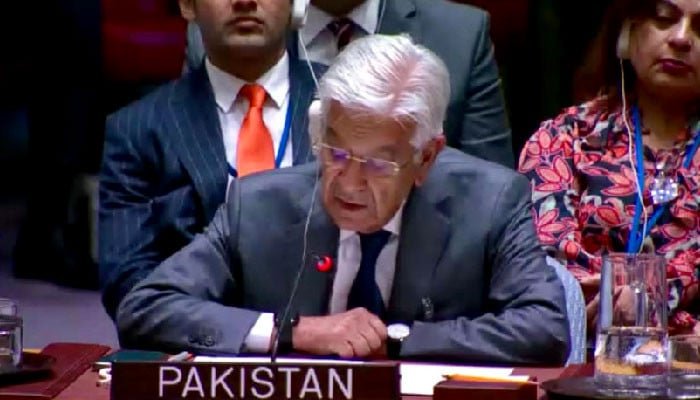AI Could Make Future Conflicts Much More Perilous, Pakistan Tells UNSC

Understanding the Gravity of AI in Military Applications
At the heart of an increasingly digital world, the potential for artificial intelligence (AI) to influence global military dynamics continues to spark intense debate. On September 25, 2025, Pakistan’s Defence Minister, Khawaja Asif, stood in front of the United Nations Security Council and painted a sobering picture of an AI-driven future. He cautioned that the growing reliance on AI within military command-and-control systems could escalate conflicts and pose a grave threat to international security.
The Dire Warnings Around AI in Military
Asif’s address comes at a time when nations are ramping up their investment in AI technologies to enhance military capabilities. According to a report from the Stockholm International Peace Research Institute, global military expenditure reached $2 trillion in 2023, with a significant portion directed towards advanced technologies, including AI.
Military analysts argue that AI could revolutionize warfare by enabling autonomous weapons systems and enhancing decision-making processes. Yet, it’s precisely this capability that concerns experts over its potential for misuse and escalatory dangers.
AI’s Double-Edged Sword
AI’s transformative potential in defense can be seen in its capability to process large sets of data, predict threats, and automate responses. In theory, this could reduce human error and make defense systems more efficient. However, the risks of accidental warfare through AI misinterpretation or malfunction loom large.
| Country | AI Military Investment (2023) | Global Ranking in AI Tech |
|---|---|---|
| United States | $800 billion | 1 |
| China | $600 billion | 2 |
| Russia | $250 billion | 3 |
| India | $100 billion | 4 |
| Pakistan | $50 billion | 20 |
Lessons from Industry Experts
According to industry experts cited by TechCrunch, the integration of AI in military systems is not just a question of capability, but also of control. The call for global standards and red lines for AI use, as echoed by Asif, corresponds with sentiments shared by tech giants and policymakers worldwide.
In a recent event covered by The Verge, major technology companies such as Google and Microsoft have already begun internal reviews to assess the ethical implications of AI in their products and services. These initiatives underscore the importance of responsible AI development, especially in contexts as sensitive as military applications.
International Efforts and Ethical Considerations
Efforts to regulate AI on a global scale are gaining momentum. Asif’s warning at the UNSC is part of an expanding dialogue that includes proposals for international treaties on AI in warfare. The challenge, however, lies in balancing national security interests with global ethical standards.
Call to Action for the Tech Community
As AI continues to pervade military spheres, the tech community has a pivotal role to play in shaping its trajectory. Developers and innovators must advocate for ethical frameworks and robust testing to prevent unintended consequences. The Pakistan Defence Minister’s clarion call is not just for governments but for the global tech industry to prioritize responsible AI development.
Conclusion
As the digital age ushers in new dimensions of warfare, the stakes have never been higher. Pakistan’s powerful address at the UNSC serves as a crucial reminder of AI’s potential for both innovation and peril. For the tech industry, the imperative is clear: lead with responsibility and pave the way for technologies that secure, rather than threaten, global peace.
Related Reading
- World leaders, AI godfathers push UN to set global red lines for dangerous AI uses by 2026
- Meta’s AI system Llama approved for use by US government agencies
- AI Revolutionizing the Textile Industry: the Next Billion-Dollar Market Opportunity




